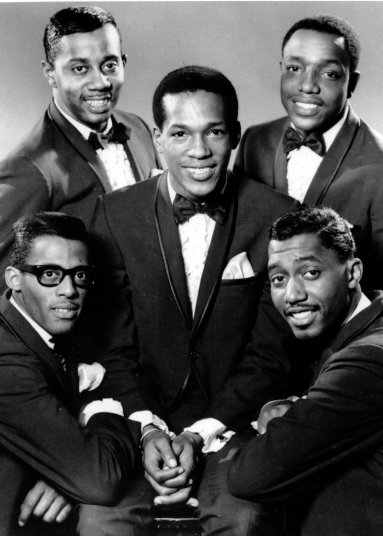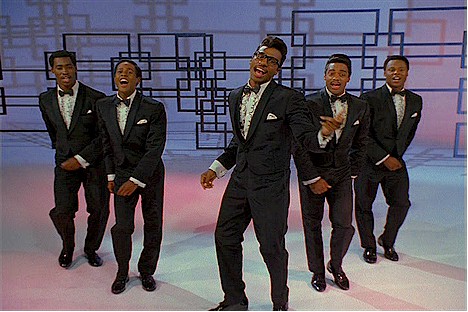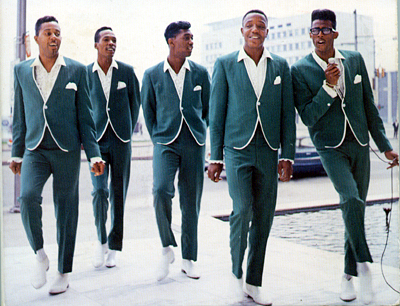THE TEMPTATIONS / “The Way You Do The Things You Do”
It was 1965. Summer. Somewhere out in the desert that is West Texas. El Paso is as far west as you can get in Texas, as much desert as any landscape on the continent. We were young men in the military. Newly thrust into manhood, we arrived from all over America.
The unit wasn’t segregated but blood generally stuck together. I remember one of our buddies was a young Japanese-American. I don’t recall his name but I will never forget him telling me he had been born in an American concentration camp during World War II.
When we weren’t in training we spent most of our free time in the rec room, shooting pool, playing cards (I became a fierce master of bid whist), or arguing about who was the better group, The Impressions or The Temptations.
 Most of the guys bet on the Temps. Me, I was smitten by Mayfield, so I hung on to The Impressions. But then The Temps dropped The Temptations Sing Smokey. The case was closed. I didn’t so much give up on The Impressions, instead it was more like I recognized a higher power when I heard it.
Motown had not yet gone slick. Nor had it totally committed itself to an American Bandstand “it’s got a nice beat and you can dance to it” type of simplified funk that later on would grate on my nerves. Even though all these songs hover around the three-minute mark, the doo-wop roots and Apollo screaming and hollering showmanship was still very much in evidence.
Most of the guys bet on the Temps. Me, I was smitten by Mayfield, so I hung on to The Impressions. But then The Temps dropped The Temptations Sing Smokey. The case was closed. I didn’t so much give up on The Impressions, instead it was more like I recognized a higher power when I heard it.
Motown had not yet gone slick. Nor had it totally committed itself to an American Bandstand “it’s got a nice beat and you can dance to it” type of simplified funk that later on would grate on my nerves. Even though all these songs hover around the three-minute mark, the doo-wop roots and Apollo screaming and hollering showmanship was still very much in evidence.
 Especially the doo-wop. These cats could sing. Really, really sing. But what sealed the deal for me was the material they covered. I was a budding, Langston Hughes-influenced poet and short story writer. Still three or four years from being published nationally but I was steady writing at night.
Regardless of how modern I thought I was, I still had to humble down with respect to the lyrics of Smokey Robinson. His way with language was unparalleled. He did narratives. He dropped metaphors to die for—“I’ve got sunshine on a cloudy day / when it’s cold outside / I’ve got the month of May” Come on, the beauty of the phrase is that it is so simple and yet so profound in describing the elemental and essential goodness of a good woman.
“You got a smile so bright / you know you could have been a candle. / I’m holding you so tight / you know you could have been a handle.” Cogent minimalism at this level is hard as hell to achieve. I was not a big fan of the early Temps, but this album: I wore it out.
Of course, I also felt the vocalisms: the multiple leads, the exquisite harmonies, the background arrangements. In many ways this was the culmination of doo-wop, this is the ultimate sounding of what the immediately preceding generation of cats had been striving to achieve.
And at the same time, we were obviously on the verge of something new. The music was changing, doo-wop was on the way out. It is not surprising that The Temptations were among the last of the great doo-woppers as well as at the forefront of the next incoming era of male groups. Funk was coming in but also bigger budgets and middle-class aspirations. Finesse vocals in the key of R&B was about to take a radical turn in a musically more sophisticated direction.
Especially the doo-wop. These cats could sing. Really, really sing. But what sealed the deal for me was the material they covered. I was a budding, Langston Hughes-influenced poet and short story writer. Still three or four years from being published nationally but I was steady writing at night.
Regardless of how modern I thought I was, I still had to humble down with respect to the lyrics of Smokey Robinson. His way with language was unparalleled. He did narratives. He dropped metaphors to die for—“I’ve got sunshine on a cloudy day / when it’s cold outside / I’ve got the month of May” Come on, the beauty of the phrase is that it is so simple and yet so profound in describing the elemental and essential goodness of a good woman.
“You got a smile so bright / you know you could have been a candle. / I’m holding you so tight / you know you could have been a handle.” Cogent minimalism at this level is hard as hell to achieve. I was not a big fan of the early Temps, but this album: I wore it out.
Of course, I also felt the vocalisms: the multiple leads, the exquisite harmonies, the background arrangements. In many ways this was the culmination of doo-wop, this is the ultimate sounding of what the immediately preceding generation of cats had been striving to achieve.
And at the same time, we were obviously on the verge of something new. The music was changing, doo-wop was on the way out. It is not surprising that The Temptations were among the last of the great doo-woppers as well as at the forefront of the next incoming era of male groups. Funk was coming in but also bigger budgets and middle-class aspirations. Finesse vocals in the key of R&B was about to take a radical turn in a musically more sophisticated direction.
 This was a very interesting moment and it was Smokey, the ultimate auteur of R&B ballads who was the foundation of the bridge used by The Temptations to crossover into a new sound. The new sound for singing groups (note, this emphasis is on groups) that would be constructed by songwriters such as Norman Whitfield, Barrett Strong, Holland-Dozier-Holland and a whole bevy of composers at Motown who carved out the new direction would eventually give way to the Gamble & Huff Philly Soul sound. So just as Motown perfected doo-wop, Philly Soul would perfect Motown. This musical changing of the guard is a tres interesting dynamic.
Moreover, every major change in the music is accompanied by a major change in the fashion—e.g. the way that black men chose to style their hair. The mid-sixties was the last stand of the patent-leather, imitation of white, hairstyle known as the “conk.”
Check on the cover. The fifties look was on the way out, not yet gone but about to be jettisoned in favor of the afro, which would subsequently be overturned by the jheri curl, and so forth, and so on. The hair on men’s heads reflecting not just how we look on the outside but a reflection also of an inner struggle for identity and authenticity.
In a similar way the modes and mores of interpersonal, intimate relationships also turn with the times. Listen to the music, to how we express (or eschew) romance. What has happened to us today? Where are today’s love songs? Is any group of male singers producing an album like The Temptations Sing Smokey? I don’t mean a retro set of seventies covers. I mean a set of original and contemporary material that celebrates black on black love.
That was both the genius of Smokey’s songs as well as the beauty of The Temps vocal work: they were celebrating black love. And though this music is forty-some years old, there is still a relevancy, still a beauty, still a timeless expression of the profoundness of loving relationships pulsing at the core of this utterly elemental, awe-inspiring music.
—Kalamu ya Salaam
Based on his songwriting
My first reaction after hearing the beginning of these records was almost always the same: Smokey wrote that one too? ??!! "Who's Loving You." "My Girl." "The Way You Do The Things You Do." I had no idea. Goddamn. I'm sitting here thinking about it: even if Smokey had never sung a note, either with The Miracles or solo, and even if he'd never gone on to have success in the Motown boardroom, the man would still be a legend of black music based on his songwriting credits alone. Hmmm....
—Mtume ya Salaam
This was a very interesting moment and it was Smokey, the ultimate auteur of R&B ballads who was the foundation of the bridge used by The Temptations to crossover into a new sound. The new sound for singing groups (note, this emphasis is on groups) that would be constructed by songwriters such as Norman Whitfield, Barrett Strong, Holland-Dozier-Holland and a whole bevy of composers at Motown who carved out the new direction would eventually give way to the Gamble & Huff Philly Soul sound. So just as Motown perfected doo-wop, Philly Soul would perfect Motown. This musical changing of the guard is a tres interesting dynamic.
Moreover, every major change in the music is accompanied by a major change in the fashion—e.g. the way that black men chose to style their hair. The mid-sixties was the last stand of the patent-leather, imitation of white, hairstyle known as the “conk.”
Check on the cover. The fifties look was on the way out, not yet gone but about to be jettisoned in favor of the afro, which would subsequently be overturned by the jheri curl, and so forth, and so on. The hair on men’s heads reflecting not just how we look on the outside but a reflection also of an inner struggle for identity and authenticity.
In a similar way the modes and mores of interpersonal, intimate relationships also turn with the times. Listen to the music, to how we express (or eschew) romance. What has happened to us today? Where are today’s love songs? Is any group of male singers producing an album like The Temptations Sing Smokey? I don’t mean a retro set of seventies covers. I mean a set of original and contemporary material that celebrates black on black love.
That was both the genius of Smokey’s songs as well as the beauty of The Temps vocal work: they were celebrating black love. And though this music is forty-some years old, there is still a relevancy, still a beauty, still a timeless expression of the profoundness of loving relationships pulsing at the core of this utterly elemental, awe-inspiring music.
—Kalamu ya Salaam
Based on his songwriting
My first reaction after hearing the beginning of these records was almost always the same: Smokey wrote that one too? ??!! "Who's Loving You." "My Girl." "The Way You Do The Things You Do." I had no idea. Goddamn. I'm sitting here thinking about it: even if Smokey had never sung a note, either with The Miracles or solo, and even if he'd never gone on to have success in the Motown boardroom, the man would still be a legend of black music based on his songwriting credits alone. Hmmm....
—Mtume ya Salaam
This entry was posted on Monday, March 24th, 2008 at 12:11 am and is filed under Cover. You can follow any responses to this entry through the RSS 2.0 feed. You can leave a response, or trackback from your own site.
Leave a Reply
| top |